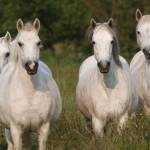Fighting Inflammation in Older Horses: Omega-3 Fatty Acids

Nutrition plays a pivotal role not only on the lifespan of horses but also their health span. In other words, living both a long and healthy life requires optimal nutrition. Low-grade inflammation purportedly predisposes ageing horses to various diseases, and this is known as inflammaging. One example of inflammaging is pituitary pars intermedia dysfunction (PPID, equine Cushing’s disease).
The exact cause of inflammaging, despite being widely recognized, remains unclear. Ways to diminish the negative effects of inflammaging and therefore the development of various age-related conditions, including PPID, have yet to be documented. An international group of veterinary researchers* set out to gather information on this condition. They started out by collecting blood samples from 42 healthy senior horses (aged 18-29 years) to analyze various circulating nutrient and inflammatory markers.
“The purpose of the study was to examine the potential relationships between inflammatory parameters and various vitamin, mineral, fatty acid, blood cell counts, internal organ function, markers of muscle mass, and PPID measures in senior horses,” explained Kathleen Crandell, Ph.D., a Kentucky Equine Research nutritionist.
She added, “Understanding the intricacies of these relationships will provide information on the underlying causes of inflammaging. Further, information can also be attained regarding how nutrition could help reverse or control age-related inflammation, the development of age-related diseases, and degenerative changes such as muscle wasting, a common finding in older horses,”
One of the main relationships between the blood parameters and inflammaging was a notable increase in certain fatty acids. Specifically, obvious increases in the anti-inflammatory fatty acids docosadienoic acid and docosapentaenoic acid were found with an increase in inflammatory mediators (e.g., interferon-γ and tumor necrosis factor-α).
This finding was somewhat surprising because the researchers expected inflammaging to be inversely associated with known anti-inflammatory nutrients.
One potential explanation for the concurrently elevated levels of inflammatory mediators and anti-inflammatory fatty acids involved a compensatory effect, meaning the anti-inflammatory fatty acids were elevated in an attempt to control the increased inflammatory mediators that were found circulating in older horses.
“The circulating anti-inflammatory fatty acids could be overwhelmed, suggesting nutritional intervention with supplemental omega-3 fatty acids would be beneficial. A marine-derived fatty acid supplement, such as EO-3, contains 6,750 mg of the anti-inflammatory omega-3 fatty acids eicosapentaenoic acid and docosahexaenoic acid in a one-ounce serving, and may help control inflammaging in horses,” Crandell said.
*Siard-Altman, M.H., P.A. Harris, A.D. Moffett-Krotky, et al. 2020. Relationships of inflammaging with circulating nutrient levels, body composition, age, and pituitary pars intermedia dysfunction in a senior horse population. Veterinary Immunology and Immunopathology 221:110013.








